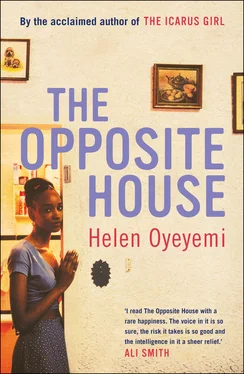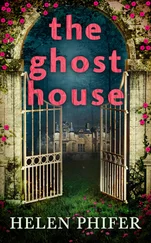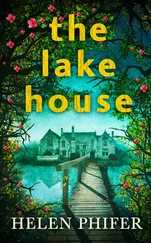Helen Oyeyemi - The Opposite House
Здесь есть возможность читать онлайн «Helen Oyeyemi - The Opposite House» весь текст электронной книги совершенно бесплатно (целиком полную версию без сокращений). В некоторых случаях можно слушать аудио, скачать через торрент в формате fb2 и присутствует краткое содержание. Год выпуска: 2008, Издательство: Bloomsbury UK, Жанр: Современная проза, на английском языке. Описание произведения, (предисловие) а так же отзывы посетителей доступны на портале библиотеки ЛибКат.
- Название:The Opposite House
- Автор:
- Издательство:Bloomsbury UK
- Жанр:
- Год:2008
- ISBN:нет данных
- Рейтинг книги:4 / 5. Голосов: 1
-
Избранное:Добавить в избранное
- Отзывы:
-
Ваша оценка:
- 80
- 1
- 2
- 3
- 4
- 5
The Opposite House: краткое содержание, описание и аннотация
Предлагаем к чтению аннотацию, описание, краткое содержание или предисловие (зависит от того, что написал сам автор книги «The Opposite House»). Если вы не нашли необходимую информацию о книге — напишите в комментариях, мы постараемся отыскать её.
The Opposite House — читать онлайн бесплатно полную книгу (весь текст) целиком
Ниже представлен текст книги, разбитый по страницам. Система сохранения места последней прочитанной страницы, позволяет с удобством читать онлайн бесплатно книгу «The Opposite House», без необходимости каждый раз заново искать на чём Вы остановились. Поставьте закладку, и сможете в любой момент перейти на страницу, на которой закончили чтение.
Интервал:
Закладка:
Mami bit her lip. She had a pupil to tutor in half an hour, but she promised Tomás that afterwards she would make him the best pasteles he’d ever had and they would talk. Tomás stood there with the strap of his schoolbag unravelling around his hand and he shook his head, meaning No, there would be no debate on the matter.
Chabella said, ‘Tomás, come now. Is it the other boys?’
Tomás said something, but we couldn’t understand him because his teeth were clattering so loudly against each other. Papi sat and looked at Tomás; he looked and looked, his gaze became abstracted somehow. Tomás put his hand to his forehead, hid his eyes, but he stayed where he was until Papi told him, ‘Say that again?’
Tomás managed, ‘It’s so cold there.’ Papi got up and checked Tomás’s face, held Tomás to him in a rough bear hug that Tomás struggled against. Contact was gaylord.
Mami said again, ‘Is it the other boys?’
Papi said, ‘Don’t you hear him? He’s cold!’
He ran Tomás a hot bath, made him undress and get into it. Tomás sat in the bath with steam rising off him in blinding waves. He shivered and said, ‘Can’t get warm.’
He kept his school scarf on, looped around his neck like a boa constrictor. He wrapped his arms around himself and jolted in silence; with each shiver he almost fell out of the bath. It was like the cold had jammed itself deep into his bones and was climbing back up atop a pneumatic drill. It was only September. In the bathroom we debated Tomás’s sanity, even though there wasn’t really room for all of us in there. Chabella cradled his head and chanted prayers and wondered aloud, ‘Has someone cursed the London baby? Someone is sending him strong memories of Cuban weather so that he cannot bear it here.’
Papi said, ‘How is it that neither of these children have inherited my excellent nervous system?’
I shouted Papi down, ‘What, what?’ and Chabella said, ‘Your nervous system, your nervous system indeed.’ She cupped her hands around Tomás’s ear and blew gently, gently, warm air into his mind. Tomás’s eyes fluttered closed and he sighed, but he still trembled.
Papi shook his head impatiently and said, ‘Chabella, that’s enough. It’s obvious that he’s in some kind of shock. Though why school should send him into shock and none of the other boys, God only knows. What the boy needs is to restart his circulation.’
His voice was so fierce it made Chabella stand away to let him by. Papi sat on the edge of the bath, reached into the water and closed his fingers around Tomás’s ankle. Tomás flinched, panicked and yelled, ‘No, get off!’
Papi said, ‘Nonsense. I’m your father.’ He ran his palm along Tomás’s right foot, then his left, over and over, circle shapes, star shapes. Papi tickled Tomás’s soles, pinched his calves, rubbed the muscles there. He watched Tomás relax and lay back in the water, shoulders pillowed on soapy bubbles. Chabella closed the door then, and she didn’t ask Tomás about the other boys any more. She sent him back to school with sweet tea and extra scarves. My brother came home with an empty flask and a report: the day had been warmer.
In Aya’s Cuba, before before, a trick of silence rippled over the bleached facade of the Regla house as soon as a stranger’s voice was heard. The house teetered amongst sun-frayed baobab branches, a spoilt child proudly cradled in a multitude of arms, oblivious to danger. Yemaya, much younger then, played the way that she preferred to, hiding and seeking another pretend Yemaya amongst hill-sized tree roots.
But a red-eyed visitor, he caught Aya. He had scars on both cheeks; they hissed the name of his tribe. He seized Aya by the arm and shook her. He was so much bigger than her that his long finger and thumb encircled her wrist and left room. Under the crisp sweep of his hat brim, he snarled his face away until it was gone into a puckered muzzle.
Aya
(thought, he wants to kill me )
didn’t know how to appease such hate — it wasn’t that she was too young; it was that there was too much.
‘At first I thought you were one of them,’ he said. ‘But you’re just a child.’
Around the man’s neck hung a locket of size; it clunked against his chest with its mouth open and a glossy white woman smiled out. Brown hair, pink cheeks. This visitor thought the glossy woman was something to do with Mama. Aya stared; was it true?
‘Anyway,’ the red-eyed visitor said, ‘I must have something for my pains.’
He had been drinking palm wine; she smelt it. It was his drunkenness that made him try to steal her from her home, it was folly that made him lift her and throw her over his shoulder. Aya did not struggle — she was surprised. She just thought about herself, pinned over this man’s shoulder like a sash on a costume. Her face lay against the man’s sweaty back, her knees grazed his stomach. The man stank. He clamped a hand around each of her ankles to hold her still, and he began to run. He ran fast, and Aya’s breath was almost tipped out of her.
Winded, she gasped, ‘So you like wine?’
She said, ‘You are lucky. I am for the thirsty ones.’
She spoke faintly, but she spoke plainly. She told the man, fine, keep running, keep holding on to my legs like that. Kidnap me and you shall have all your dreams. She told this visitor that if he didn’t leave go of her, he would have all the palm wine in the world to drink. Yes, she said, this I can do for you and more, but all the palm wine in the world will never be enough to kill the thirst that will draw your stomach to your throat, tight, tight and tight. How you will drink for that thirst? You will drink so much that you’ll drown inside your own body, and your last breath will slide out over a dark bubble of bloodied wine.
Finally the man set her down and he shambled away, crying out.
Aya walked home. The visitor had not brought her far; they had not left the forest. The sun was setting, and creatures that she could only feel made their paths through the trees.
After him Aya waited for others who had been turned away and tried to do them the favours they had come to ask of Mama and the other elders. As long as the favours were small, Aya could do them.
One day, Mama caught Aya carefully peeling away a kneeling grandmother’s cloudy-milk cataracts. She brought Aya to her bedroom, where rows and rows of her plainly cut wooden masks watched with thick smiles. The masks hung on brackets that slid through their eyeholes with lighted candles balanced on their flattened planes. The masks bled red and purple silk linings that made puddles where they touched the floor, but Mama stepped over them with graceful economy, drawing her wrapper up over her ankle in the same motion that she used to raise her foot. Mama sat on her tied-cane chair and put Yemaya on her knee; she smilingly accepted sticky showers of guava kisses on both cheeks, but she was not diverted. She said, ‘Aya, I suggest you don’t do as these visitors ask. I think it is like telling lies.’
But Yemaya Saramagua, she wants the visitors.
On the utmost tiptoe with leaf-strewn balcony stone, a pain burnt into each over-stretched arch, Aya tells the trees, ‘It’s not that I’m lonely.’ The trees stoop over the somewherehouse with their heads fused together and they do not listen and they cannot be reached. ‘Not that.’
And the visitors come. They come with beaded collars in her favourite colours layered on their necks like second skins. They come chewing on her name; confident like teeth cracking kola nuts; sure as sure, bitterness bursts and loses its way under the sallow pinch of salt.
Once, a bad woman came.
She came in through the London door and found her way up the basement stairs with so little noise that Aya was startled. The woman was deep yellow and slightly built. An ivory comb with a whorled oval head crawled up her frizzy heap of hair. Someone had made this bad woman come here. She was not willing and she wore no beads; she had broken them because she was afraid. Her shoulders were a bad fit; the tops of them stood higher than was correct, and they gave her the appearance of constantly trying to achieve flight. For healing she had brought her poorly only son, a wan stick-boy of twelve who she was slowly sickening with pinches of ground glass because she hated him, because she loved him, and he would not obey her or stay by her side when he was well.
Читать дальшеИнтервал:
Закладка:
Похожие книги на «The Opposite House»
Представляем Вашему вниманию похожие книги на «The Opposite House» списком для выбора. Мы отобрали схожую по названию и смыслу литературу в надежде предоставить читателям больше вариантов отыскать новые, интересные, ещё непрочитанные произведения.
Обсуждение, отзывы о книге «The Opposite House» и просто собственные мнения читателей. Оставьте ваши комментарии, напишите, что Вы думаете о произведении, его смысле или главных героях. Укажите что конкретно понравилось, а что нет, и почему Вы так считаете.












